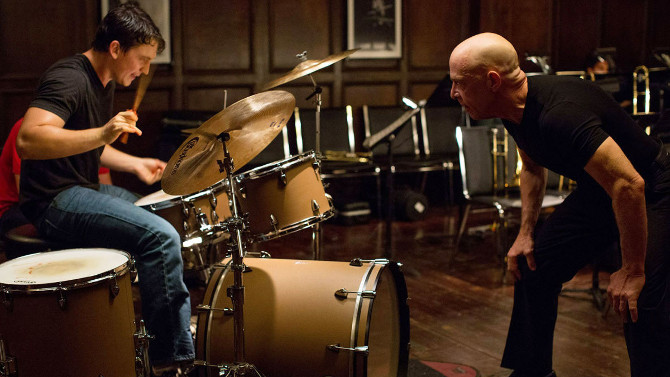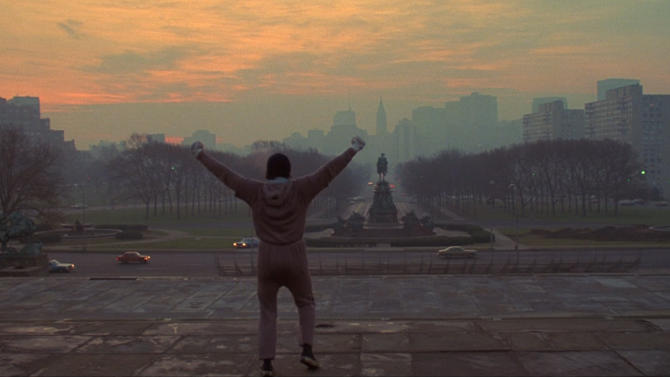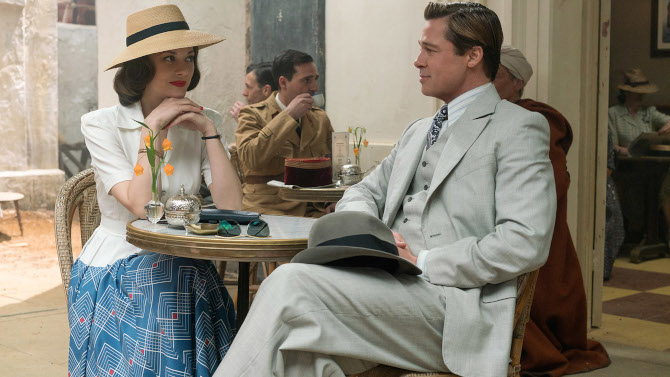
Déjà vu Dalliance
Channeling the mesmeric movies churned out by the studio system back in the 1930s and 40s, Allied (2016), directed by Robert Zemeckis, channels the likes of Morocco, Casablanca, Across the Pacific, Gilda, To Have and Have Not, and numerous others – attempting to find a spark from the classic themes of melodrama, romance, suspense and the epic nature of the annals of the cinematic past, with quite successful results. Set the year Casablanca and Across the Pacific were released – 1942, the story in fact starts in Morocco, with recently parachuted in Canadian spy Max Vatan (Brad Pitt) meeting up with another undercover agent, Marianne Beauséjour (Marion Cotillard), who will be pretending to be his wife.
-
Star Pick with Yanic Truesdale
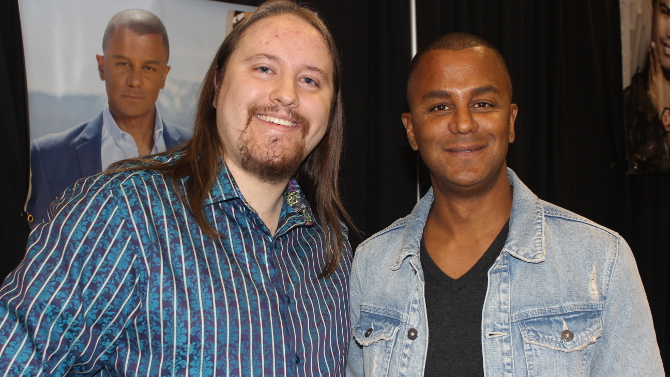 Drum Roll PleaseWhiplashJune 6, 2017
Drum Roll PleaseWhiplashJune 6, 2017Whiplash, the story of a talented drummer who is pushed to the edge by a more than intense, militarist-style instructor, took the world by storm in 2014-2015 and has continuously gained steam ever since. The simple yet effective tale that consists of a battle of the wills helped the film earn three Academy Awards: including Best Supporting Actor for J.K. Simmons as well as Best Achievement in Film Editing and Sound Mixing. Whiplash has also landed at number 45 on IMDb’s top 250 films list.
-

Modern Love
A Bigger SplashApril 28, 2017Sex and drugs and rock `n roll. . . (and marriage?) play a big part in the 2015 dramatic thriller A Bigger Splash. A quasi-remake of the 1969 film La Piscine (which has another sort-of remake in François Ozon’s 2003 picture The Swimming Pool), which itself comes from a novel of the same name (written by Jean-Emmanuel Conil under the pseudonym Alain Page), this very European feature is set on the lovely Italian island of Pantelleria. We first meet music icon Marianne Lane (Tilda Swinton – a perfect turn as an androgynous David Bowie-like rock `n roller), who is recovering from throat surgery, and her documentary filmmaker husband Paul De Smedt (Matthias Schoenaerts) as they enjoy the reclusive island, finding love and recuperation in its serene, picturesque setting. As they are frolicking in the waters of a secluded lake, they receive a call from Paul’s kind-of best friend and Marianne’s former lover/record producer, Harry Hawkes (Ralph Fiennes), who has tracked them down and invited himself for a visit. Director Luca Guadagnino both symbolically and literally interprets the rather rude interruption by having Harry’s incoming plane cast a long shadow and make a raucous noise just over their heads as they take the unexpected and unwanted call.
-
Star Pick with Doug MacLeod
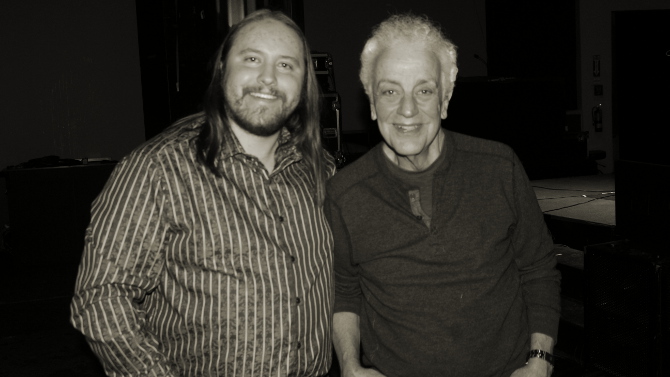 Beating the BluesRockyMarch 28, 2017
Beating the BluesRockyMarch 28, 2017Recently, I was fortunate enough to sit down with blues legend Doug MacLeod. A one man show, the acoustic maestro does it all while on stage; not only does he sing, play the guitar and stomp, but he also throws out important life lessons, tells jokes, and regales his audience with engaging stories – making him just as much a philosopher (see him live to learn of his bucket theory), storyteller, motivational speaker and stand-up comedian (though as the blues man quite cleverly pointed out, he is actually a sit-down comic – as he performs while seated). The winner of countless awards for his craft, the last few years should provide you with a good idea of his pedigree: in 2013, he took home Male Blues Artist of the Year at the Blues Blast Music Awards. Then in 2014, MacLeod won both Acoustic Artist and Acoustic Album of the Year at the Blues Music Awards, once again claiming the top prize of Acoustic Artist of the Year in 2016. This year, he has been honored with a nomination for his most recent album "Doug MacLeod – Live in Europe" – which is up for Best Historical Album, while also looking for a third win in the Acoustic Artist category. He has released an impressive 24 albums over the past thirty plus years.
-
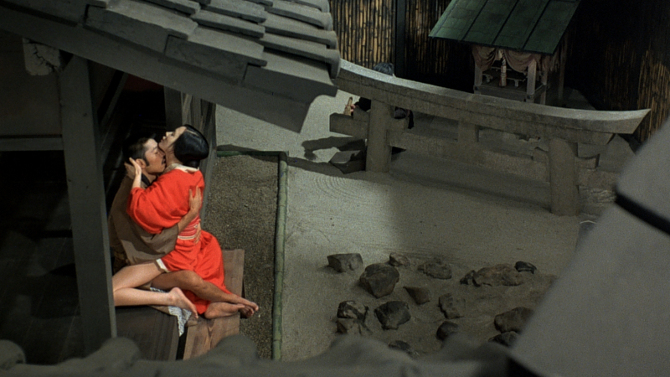
Sexual Sense and Sensibility
In the Realm of the SensesMarch 19, 2017In the Realm of the Senses has been called eroticism, a sharp political statement, an arthouse film, pornography, as well as a searing drama, and, it is likely that it has been defined as being so many other things as well. Like most boundary pushing pieces of art, it transcends the ability to label it as just one of these descriptive terms, combining all of them to create a unique and ever controversial piece of cinema. Released in 1976, it was only able to be made in the first place thanks to it being a Japanese/French co-production (listed as a French enterprise) – the unfinished film had to be shipped out of Japan and into France to avoid issues with strict Japanese censorship laws (it was processed and edited in Europe because of it). Banned in most countries upon first release (with many only lifting it completely in the 1990s and 2000s) – though it showed at numerous film festivals (the Cannes Film Festival had to orchestrate thirteen screenings due to demand), In the Realm of the Senses is still censored in Japan to this day.
-
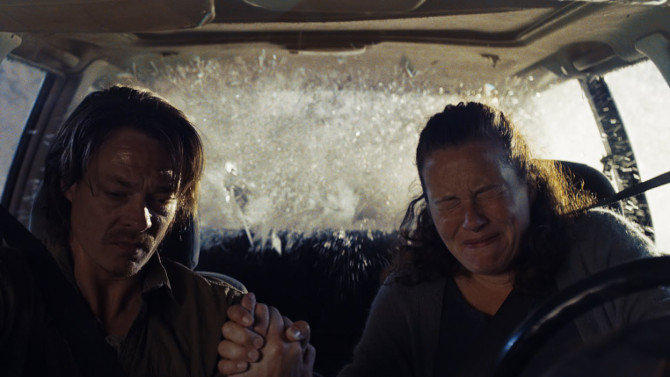
Ride Out the Wave
The WaveMarch 14, 2017Disaster movies live and die by their clichés. What brings people into the seats are the doom-laden spectacles, though it is precisely these over-the-top depictions that often overshadow the human element that is oh-so-important in every one of these genre pictures. It is a tightrope to walk, with features from the past decade or so like The Day After Tomorrow, 2012 and Pompeii wholly missing the point. A more realistic film that still delivers an intense natural disaster, but is rooted in the family that it portrays, is the 2015 Norwegian movie The Wave. Instead of ‘go big or go home’, writers John Kåre Raake and Harald Rosenløw-Eeg, along with director Roar Uthaug (who has been given the reigns of the Tomb Raider reboot starring Alicia Vikander) decide to take a more focussed, local, ‘home’ driven perspective, setting their story in a picturesque, almost otherworldly little fjord nestled in the heart of Norway. A small, tightknit community lives in the impressive locale; it takes in nearly as many tourists as the amount of villagers living there.
-

Night Moves
Nocturnal AnimalsFebruary 28, 2017Some of you may recall famous clothing designer Tom Ford deciding to enter into the world of film making back in 2009. Though some were sceptical, his first foray into the movie business was a huge critical success, as A Single Man became one of the most lauded pictures of the year. Now seven years on, the choosy, multi-talented man has finally found another project that has piqued his interest. Based upon Austin Wright’s 1993 novel "Tony and Susan", Ford adapted it, changing the title to Nocturnal Animals. A complicated, three pronged tale, the story, at least in the real world, follows a wealthy art gallery owner named Susan Morrow (Amy Adams), a cold, calculating woman, who, despite seemingly having everything (a handsome husband named Hutton – Armie Hammer, a beautiful Hollywood hills house, good looks, and money), is empty and dead inside.

